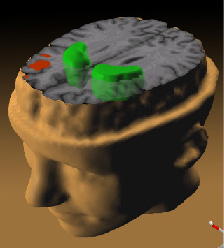Causes of schizophrenia
Causes of Schizophrenia[edit | edit source]
Schizophrenia is a complex mental disorder characterized by disruptions in thought processes, perceptions, emotional responsiveness, and social interactions. The exact causes of schizophrenia are not fully understood, but it is believed to result from a combination of genetic, environmental, and neurobiological factors.
Genetic Factors[edit | edit source]
Genetic predisposition plays a significant role in the development of schizophrenia. Studies have shown that individuals with a family history of schizophrenia are at a higher risk of developing the disorder. Specific genes have been associated with schizophrenia, although no single gene is responsible for the condition. Instead, it is likely that multiple genes contribute to the risk, each having a small effect.
Environmental Factors[edit | edit source]
Environmental factors are also believed to contribute to the onset of schizophrenia. These may include prenatal exposure to infections, malnutrition, and stress. Childhood trauma and substance abuse, particularly during adolescence, have also been linked to an increased risk of developing schizophrenia.
Neurobiological Factors[edit | edit source]
Neurobiological factors involve abnormalities in brain structure and function. Imaging studies, such as Positron Emission Tomography (PET) scans, have shown differences in the brains of individuals with schizophrenia compared to those without the disorder. These differences include alterations in the size and activity of certain brain regions, such as the prefrontal cortex and hippocampus.
Neurotransmitter Imbalance[edit | edit source]
An imbalance in neurotransmitters, particularly dopamine and glutamate, is thought to play a crucial role in schizophrenia. The dopamine hypothesis suggests that overactivity of dopamine transmission in certain brain pathways contributes to the symptoms of schizophrenia. Similarly, glutamate dysfunction is also implicated in the disorder.
Related Pages[edit | edit source]
Search WikiMD
Ad.Tired of being Overweight? Try W8MD's NYC physician weight loss.
Semaglutide (Ozempic / Wegovy and Tirzepatide (Mounjaro / Zepbound) available. Call 718 946 5500.
Advertise on WikiMD
|
WikiMD's Wellness Encyclopedia |
| Let Food Be Thy Medicine Medicine Thy Food - Hippocrates |
Translate this page: - East Asian
中文,
日本,
한국어,
South Asian
हिन्दी,
தமிழ்,
తెలుగు,
Urdu,
ಕನ್ನಡ,
Southeast Asian
Indonesian,
Vietnamese,
Thai,
မြန်မာဘာသာ,
বাংলা
European
español,
Deutsch,
français,
Greek,
português do Brasil,
polski,
română,
русский,
Nederlands,
norsk,
svenska,
suomi,
Italian
Middle Eastern & African
عربى,
Turkish,
Persian,
Hebrew,
Afrikaans,
isiZulu,
Kiswahili,
Other
Bulgarian,
Hungarian,
Czech,
Swedish,
മലയാളം,
मराठी,
ਪੰਜਾਬੀ,
ગુજરાતી,
Portuguese,
Ukrainian
Medical Disclaimer: WikiMD is not a substitute for professional medical advice. The information on WikiMD is provided as an information resource only, may be incorrect, outdated or misleading, and is not to be used or relied on for any diagnostic or treatment purposes. Please consult your health care provider before making any healthcare decisions or for guidance about a specific medical condition. WikiMD expressly disclaims responsibility, and shall have no liability, for any damages, loss, injury, or liability whatsoever suffered as a result of your reliance on the information contained in this site. By visiting this site you agree to the foregoing terms and conditions, which may from time to time be changed or supplemented by WikiMD. If you do not agree to the foregoing terms and conditions, you should not enter or use this site. See full disclaimer.
Credits:Most images are courtesy of Wikimedia commons, and templates, categories Wikipedia, licensed under CC BY SA or similar.
Contributors: Prab R. Tumpati, MD

